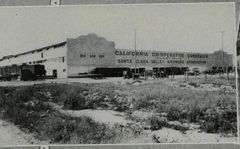California Cooperative Canneries
| Business |
Cannery |
|---|---|
| Brands |
X Ray, Suncarest, Dew Taste, Calamade, Cock o' the Walk. |
| Aliases |
Santa Clara Valley Growers Association |
| Successors |
Tri-Valley Packing |

California Cooperative Canneries was an Armour-affiliated cannery, founded in 1919 as part of the meat packing company's attempt to expand once again into fruits and vegetables. Although nominally independent, California Cooperative Canneries had a ten year contract to sell its full production to Armour[2]. Armour argued that the setup would give farmers more flexibility and profits, but others saw it as an attempt by the meat-packers to dominate another area of food production.
Armour's contract with California Cooperative Canneries had effect between May 1919 and January 1929. It declared that the cannery would sell all canned fruit required by Armour, and sell at the current California Packing Corporation's prices unless such a price would be less than the cost of production. The cannery could sell any fruit beyond Armour's needs as of January 1, and could also sell any canned fruit that Armour did not use. Armour also held a mortgage on one of California Cooperative Cannery's buildings, initially $250,000 but reduced to $200,000 by 1922.
The movement sparked an epic anti-trust battle between the US Government and Armour and Swift, leading to a consent decree against the meat-packers; Armour relinquished the company soon after. There are signs that the canneries were to be sold to Bisceglia Brothers, with the new company continuing to sell to Armour[3] Bisceglia Brothers will continue contracts with Armour. By 1924, the "independent" canneries were deeply in debt to packers. The consent decree was suspended from 1925 to 1929; the Supreme Court ruled anti-trust action was appropriate[4]. Eventually, they were allowed to keep the business[5]. Even then, the canneries only survived a few more years, being sold to Tri-Valley Packing in 1932.
Even with the anti-trust ruling, the company still expanded to Modesto by the summer of 1920, requesting subscriptions for the plant in March 1920[6].
In 1920, the president was S. E. Johnson, with Albert Jaentze as secretary[7]. The company's manager was Vernon Campbell in 1921; he shows up in many press quotes during the early founding of the company. Floyd Bohnett, an enthusiastic member in 1922[8], also appeared in the press.
A 1922 Canners Directory shows sites in San Jose and Modesto, with offices in Cunard Building in San Francisco[9]. San Jose's plant was one of the biggest canneries in the county in 1922; a 1922 history noted "There are forty canning factories in the county. One of these, the Co-operative plant, is the largest in the world. In 1921 it absorbed 30,000 tons of fruit and employed nearly 1,000 people. In the busy season of that year the combined county payroll reached over two million dollars."
Locations
| Location | Plant # | Years | Address | Details |
|---|---|---|---|---|
| Hemet | North Harvard Ave., north of Devonshire[10]. | Buildings apparently still exist. | ||
| Modesto | Plant #5[11] | 1920, 1922 | 14th and D Streets[12] | Plant in operation by mid-July 1920[13] Site appears to be the current <a href="http://www.stanislausfoodproducts.com">Stanislaus Food Products tomato cannery</a>. |
| San Francisco | 1922 | Cunard Building | ||
| San Jose | 1920, 1922 | Tenth and Taylor | ||
| Tulare | 1920 | |||
| Visalia | 1920 |
References
- ↑ Pacific Service Magazine, October 1926.
- ↑ In Packers' Consent Decree: Hearings Before a Subcommittee of the Committee on Agriculture and Forestry, United States Senate, Sixty-Seventh Congress, Second Session, Pursuant to Senate Resolution 211, to Investigate Matters Concerning the Consent Decree Entered in the Supreme Court of the District of Columbia in the Case of the United States of America, Plaintiff, V. Swift & Co. Et Al., Defendants. U. S. Senate, March 23 and April 21, 1922. Contract appears in the hearing transcript
- ↑ January 7, 1920 Evening News
- ↑ Thomas C. Blaisdell, An Experiment in the Control of Business. 2008, Lawbook Exchange Ltd. p. 202. Originally published by Columbia University Press in 1932.
- ↑ May 20, 1929 Bakersfield Californian.
- ↑ California Cooperative Canneries. March 13, 1920 Pacific Rural Press. $117,000 in subscriptions were reached for the Modesto plant, with 2,000 tons of fruit possible.
- ↑ California Co-Operative Canneries: California Food Products directory. 1920, A. Marks, San Francisco.
- ↑ Floyd Bohnett biography.
- ↑ 1922 Cannery's Directory
- ↑ Packing Houses of Southern California.
- ↑ Photo, Employees, California Co-opeative Canneries Plant #5, Modesto. Robert Bowdidge collection.
- ↑ Break Ground on New Cannery Here April 1: March 15, 1920 Modesto Evening News. "Ground will be broken about April 1 on the Stanislaus Growers Assocation plant, a unit of the California Co-operative Canneries, at Fourteenth and D Streets, Modesto, the ten-acre site that has been chosen, according to Walter Baird of the Modesto Terminal company."
- ↑ Short Checks Cause Trouble in Co-Operative Cannery. August 5, 1920 Modesto Evening News. "John Elliot of San Jose was installed as superintendent at the plant yesterday, displacing F. W. Hoskins, who had charge since the cannery began operations nearly two weeks ago."